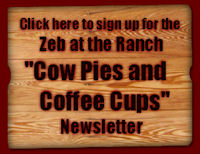
Click on a Newsletter:
Click Here for a List of Our Sponsers
|

Rodeo Announcer Bell Dusts Himself Off After Setbacks
By Joe Hawk
Las Vegas Review Journal, Saturday, June 21, 1997
When Zeb Bell exhorts the fans attending tonight's final performance of the Elks
Helldorado Rodeo at the Thomas & Mack Center to "Give it up for these tough old
cowboys," he won't be speaking solely from the diaphragm, like most deep-voiced
arena announcers.
Bell also will be speaking from the heart.
For he, too, has proven to be one "tough old cowboy."
A survivor of polio as a child as well as a plane crash and a near-fatal rodeo spill
as an adult, the 49-year resident of Murtaugh, Idaho, knows the thrill of waving
his cowboy hat in celebration of a winning ride.
Only Bell's ride has been, and continues to be, on that unpredictable bucking bronc
called Life.
A three-time announcer of the National Finals Rodeo -- 1983 and '84 in Oklahoma
City and 1990 in Las Vegas -- Bell works approximately 175 days and nights of rodeo
each year. During the winter months, he does voice-overs for videos and movies and
is a highly sought motivational speaker.
Wherever Bell goes to speak, the message inevitably begins with the metal crutches
that help him to walk; they've been his companion ever since he was diagnosed with
poliomyelitis at age 5. But he also brings with him vivid memories of a plane crash
in 1971 that killed the pilot and nearly claimed his life and that of his father-in-law.
And then there was the 1978 team roping accident when he was crushed by a falling
horse.
Even on their worst rodeoin' days, most cowboys don't face the soul-searching setbacks
that Bell has faced -- and amazingly overcome.
"I'm so thankful, because there isn't anything I haven't had a chance to do," he
says, his tone richly sincere. "I know that every day on this planet is another
day I can thank God for making me strong enough to handle the things I have.
"I guess it pays to be a Christian," he adds with a respectful chuckle.
Bell's first setback came during the national polio epidemic of the early 1950s
and left him with an impaired left leg. His second and third setbacks, however,
almost claimed his life.
Flying to a rodeo convention in Lewiston, Idaho, in 1971, the plane he was in crashed
into a mountaintop during a heavy snowstorm. The pilot died, and Bell and his father-in-law,
Dean Ricketts, suffered severe injuries.
Bell broke "just about everything but my left leg," while Ricketts broke "just about
everything from the waist up, including splitting open his skull." Still, Ricketts
walked 15 miles through three feet of snow to reach a rescue crew. Three days after
the crash, Bell was brought out.
He spent seven long months recovering.
"It was funny my left leg was the one thing that didn't break," Bell recalls. "I
was told afterward that if it had, I would have lost it."
Seven years later, Bell almost "cashed in the chips" again.
A lover of team roping, he found if he tied his left leg to the side of his horse
he could compete -- mostly for fun -- as the heeler. But during a rodeo in Twin
Falls, Idaho, in 1978, the horse Bell was riding lost its footing and tumbled on
top of him. The most serious of many injuries: three broken ribs and temporary blindness.
"It was bad, but it certainly could have been worse," he says, adding it took only
three days to get his sight back but two months to fully recuperate. "If it had
rolled a little differently, I wouldn't be here."
Not surprisingly, though, Bell is here -- announcing his first Helldorado rodeo.
In a career that has included broadcast work in baseball, basketball and auto racing,
Bell beams as he proclaims "Nothing beats rodeo" -- whether it be the high school
and collegiate nationals or Professional Rodeo Cowboys Association events, such
as the Helldorado.
"This is the one sport where, as an announcer, you can raise the roof and try to
get the crowd to feel what the competitors feel," he says. "You know, the ups and
downs."
Ups and downs?
No one knows better than Zeb Bell what it's like to experience those. Which makes
everything he says behind a rodeo microphone just a little more meaningful.
|